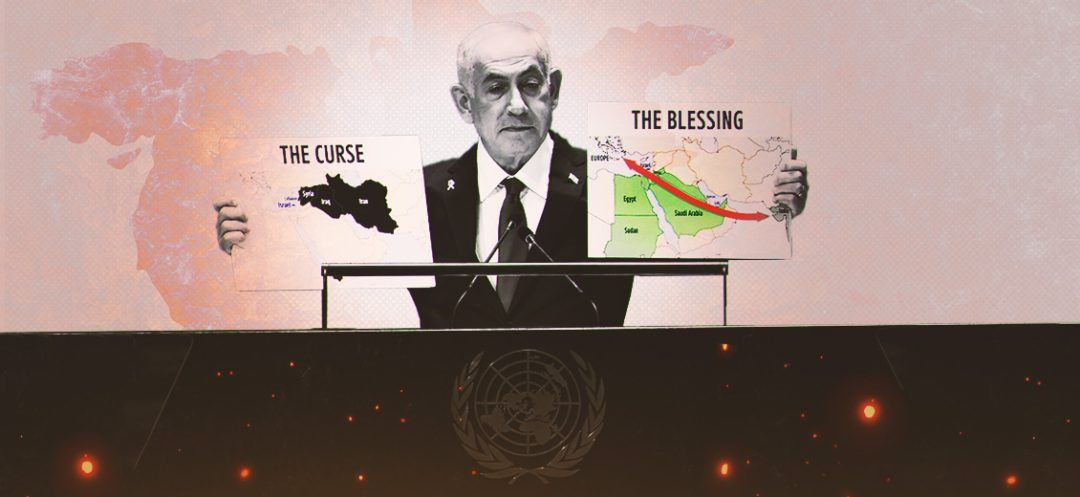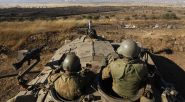
Israeli Prime Minister Benjamin Netanyahu handled the joint United States-French ceasefire initiative in Lebanon much as he did US President Joe Biden’s earlier call for a truce in Gaza.
Although the statement was coordinated with Netanyahu and supported by several Western and Arab nations, he later withdrew his backing and omitted any mention of it during his address at the United Nations General Assembly.
The joint proposal from Presidents Joe Biden and Emmanuel Macron sought a 21-day ceasefire in Lebanon to facilitate a diplomatic agreement, allowing civilians on both sides of the border to return to their homes. Yet, with the conflict intensifying, the likelihood of success remains slim.
Israel rejected a ceasefire and remained resolute in continuing its "war" against Hezbollah, possibly resorting to a ground operation to achieve its objectives: enforcing the ceasefire, relocating weapons and rockets from southern Lebanon to north of the Litani River and sending them back to Iran, while blocking any future arms shipments to Hezbollah.
Before leaving for New York, Netanyahu directed the military to press on with airstrikes on Lebanon, focusing on Hezbollah leaders and their weapons and missile depots. He traveled with strong domestic backing to confront Hezbollah, push them away from the border and ensure the safety of returning settlers. Some ministers warned Netanyahu that they would resign if he agreed to a ceasefire, while northern settlers urged him to reject any truce, insisting, "Now is not the time for a ceasefire, but to finish the war. Don’t let us down." The airstrikes continued, targeting crossings between Lebanon and Syria used to funnel Iranian weapons to Hezbollah.
Israel's dismissal of the joint statement and its continued military actions serve as a means of applying pressure on Hezbollah to meet its conditions.
Washington aims to separate the crises in Lebanon and Gaza, advocating for a diplomatic resolution to the conflict while preventing Netanyahu from turning Lebanon into a second Gaza. This includes halting any ground invasion of southern Lebanon to establish a demilitarized buffer zone along the border, as such actions could trigger a broader regional war. Israel insists on a clear separation of southern Lebanon from Gaza, an immediate ceasefire, the relocation of weapons and rockets to north of the Litani River, their return to Iran, and full compliance with Resolution 1701.
On the eve of the General Assembly, Caretaker Prime Minister Najib Mikati decided to travel to New York following communications from President Macron, US special envoy Amos Hochstein and key Arab and Western officials to engage in discussions aimed at securing a ceasefire. Mikati consulted with House Speaker Nabih Berri, who had liaised with Hezbollah, and entrusted him with managing the unfolding situation while keeping Mikati informed. The latter then met with Hezbollah's political aide, Hussein Khalil, who conveyed his hopes for a successful mission.
In this context, media outlets reported that Berri is actively engaging with the Americans and others to curb Israel's recent escalation against Lebanon, indicating that decisive steps are expected to successfully advance efforts toward a political solution. Berri emphasized that this initiative seeks to ensure that southern Lebanon remains linked to Gaza.
Meanwhile, Mikati intensified his communications in New York with various officials to create a favorable environment for the acceptance of the statement. Among those he met was Iranian President Masoud Pezeshkian, who previously stated to CNN, "Hezbollah cannot confront Israel alone, and we must not allow Lebanon to become a second Gaza under Israel's control." Pezeshkian voiced concerns that the situation could escalate into a regional conflict with potentially serious implications for the world’s future. Furthermore, the Iranian president stated, “We are willing to give up our weapons if Israel does likewise and if an international organization can ensure the security of the region."
In response to Pezeshkian’s comments, Iran’s Supreme Leader Ali Khamenei criticized them as a "blunder and a verbal slip." Additionally, the commander-in-chief of the Islamic Revolutionary Guard Corps (IRGC), Commander Hossein Salami, stated, "Hezbollah will prevail and bring further disappointment to the enemies' strategies. Even if the US, France and Britain come together, they will not succeed in defeating Hezbollah."
The Israeli war on Lebanon will continue until Netanyahu achieves his objectives, as he stated in his address to the UN General Assembly. Consequently, diplomatic sources indicate that the situation in Lebanon will persist until its aims are fulfilled, as it is pivotal for reshaping regional dynamics toward a comprehensive settlement that begins with Israel's recognition of a two-state solution. Thus, the ceasefire declaration is viewed as a crucial step toward initiating negotiations that could lead to a resolution. These sources, citing Israeli officials, emphasize that the current conflicts represent the final stages of the broader conflict, and they seek to avoid a recurrence of the events in Gaza, aiming instead for a new Middle East.
Concurrently, US-Iranian negotiations are focused on defining Iran's role in the region, explicitly rejecting its support for military factions and ensuring non-interference in the affairs of other nations. This framework is essential for realizing a sustainable settlement initiative that could bring peace to the Middle East. The critical question now is whether Iran can cultivate US goodwill and whether Tel Aviv can restore its lost trust with Washington. Will the ongoing genocidal conflicts in Gaza and Lebanon prove to be the last wars in the region, thus paving the way for a viable resolution?
Although the statement was coordinated with Netanyahu and supported by several Western and Arab nations, he later withdrew his backing and omitted any mention of it during his address at the United Nations General Assembly.
The joint proposal from Presidents Joe Biden and Emmanuel Macron sought a 21-day ceasefire in Lebanon to facilitate a diplomatic agreement, allowing civilians on both sides of the border to return to their homes. Yet, with the conflict intensifying, the likelihood of success remains slim.
Israel rejected a ceasefire and remained resolute in continuing its "war" against Hezbollah, possibly resorting to a ground operation to achieve its objectives: enforcing the ceasefire, relocating weapons and rockets from southern Lebanon to north of the Litani River and sending them back to Iran, while blocking any future arms shipments to Hezbollah.
Before leaving for New York, Netanyahu directed the military to press on with airstrikes on Lebanon, focusing on Hezbollah leaders and their weapons and missile depots. He traveled with strong domestic backing to confront Hezbollah, push them away from the border and ensure the safety of returning settlers. Some ministers warned Netanyahu that they would resign if he agreed to a ceasefire, while northern settlers urged him to reject any truce, insisting, "Now is not the time for a ceasefire, but to finish the war. Don’t let us down." The airstrikes continued, targeting crossings between Lebanon and Syria used to funnel Iranian weapons to Hezbollah.
Israel's dismissal of the joint statement and its continued military actions serve as a means of applying pressure on Hezbollah to meet its conditions.
Washington aims to separate the crises in Lebanon and Gaza, advocating for a diplomatic resolution to the conflict while preventing Netanyahu from turning Lebanon into a second Gaza. This includes halting any ground invasion of southern Lebanon to establish a demilitarized buffer zone along the border, as such actions could trigger a broader regional war. Israel insists on a clear separation of southern Lebanon from Gaza, an immediate ceasefire, the relocation of weapons and rockets to north of the Litani River, their return to Iran, and full compliance with Resolution 1701.
On the eve of the General Assembly, Caretaker Prime Minister Najib Mikati decided to travel to New York following communications from President Macron, US special envoy Amos Hochstein and key Arab and Western officials to engage in discussions aimed at securing a ceasefire. Mikati consulted with House Speaker Nabih Berri, who had liaised with Hezbollah, and entrusted him with managing the unfolding situation while keeping Mikati informed. The latter then met with Hezbollah's political aide, Hussein Khalil, who conveyed his hopes for a successful mission.
In this context, media outlets reported that Berri is actively engaging with the Americans and others to curb Israel's recent escalation against Lebanon, indicating that decisive steps are expected to successfully advance efforts toward a political solution. Berri emphasized that this initiative seeks to ensure that southern Lebanon remains linked to Gaza.
Meanwhile, Mikati intensified his communications in New York with various officials to create a favorable environment for the acceptance of the statement. Among those he met was Iranian President Masoud Pezeshkian, who previously stated to CNN, "Hezbollah cannot confront Israel alone, and we must not allow Lebanon to become a second Gaza under Israel's control." Pezeshkian voiced concerns that the situation could escalate into a regional conflict with potentially serious implications for the world’s future. Furthermore, the Iranian president stated, “We are willing to give up our weapons if Israel does likewise and if an international organization can ensure the security of the region."
In response to Pezeshkian’s comments, Iran’s Supreme Leader Ali Khamenei criticized them as a "blunder and a verbal slip." Additionally, the commander-in-chief of the Islamic Revolutionary Guard Corps (IRGC), Commander Hossein Salami, stated, "Hezbollah will prevail and bring further disappointment to the enemies' strategies. Even if the US, France and Britain come together, they will not succeed in defeating Hezbollah."
The Israeli war on Lebanon will continue until Netanyahu achieves his objectives, as he stated in his address to the UN General Assembly. Consequently, diplomatic sources indicate that the situation in Lebanon will persist until its aims are fulfilled, as it is pivotal for reshaping regional dynamics toward a comprehensive settlement that begins with Israel's recognition of a two-state solution. Thus, the ceasefire declaration is viewed as a crucial step toward initiating negotiations that could lead to a resolution. These sources, citing Israeli officials, emphasize that the current conflicts represent the final stages of the broader conflict, and they seek to avoid a recurrence of the events in Gaza, aiming instead for a new Middle East.
Concurrently, US-Iranian negotiations are focused on defining Iran's role in the region, explicitly rejecting its support for military factions and ensuring non-interference in the affairs of other nations. This framework is essential for realizing a sustainable settlement initiative that could bring peace to the Middle East. The critical question now is whether Iran can cultivate US goodwill and whether Tel Aviv can restore its lost trust with Washington. Will the ongoing genocidal conflicts in Gaza and Lebanon prove to be the last wars in the region, thus paving the way for a viable resolution?
Read more



Comments